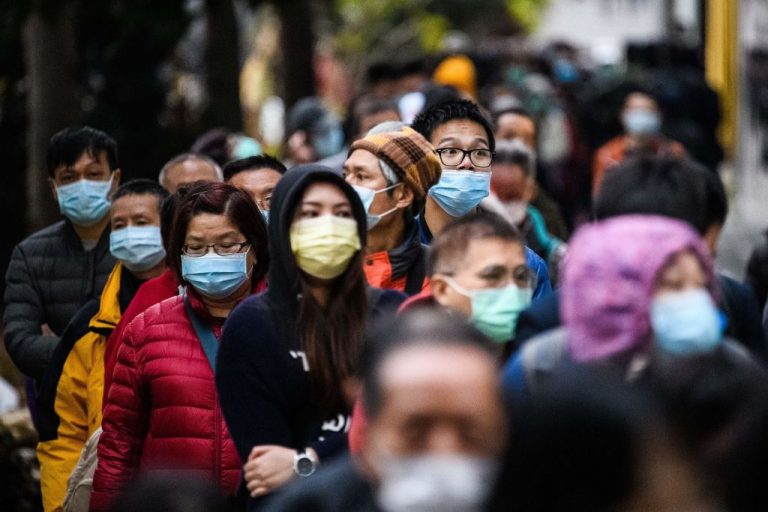A growing number of Hong Kong residents have reported experiencing symptoms of post-traumatic stress disorder (PTSD) following the first year of the COVID-19 pandemic and subsequent lockdowns that have been implemented across China.
According to a recent study, one in 10 residents residing in Hong Kong has been experiencing some level of irritability — with symptoms ranging from anger and denial, to anxiety and depression stemming from constantly thinking about or being inconvenienced by the pandemic.
Between December 2020 and February last year, researchers at the Polytechnic University in Hong Kong interviewed 3,011 residents randomly selected via phone interviews and found that 12.4 percent of respondents were exhibiting symptoms of PTSD.
READ MORE ON HONG KONG’S CORONAVIRUS SITUATION:
- Meanwhile In Hong Kong: COVID Cases and Deaths Touch the Sky
- Hong Kong Authorities Announce New COVID Preventive Measures as Cases and Deaths Rise
- Hong Kong Hospitals Placing Body Bags Under Patients’ Beds as COVID-19 Surges Out of Control
The study’s researchers warned that the actual numbers could be much higher as the city of nearly 7.5 million residents is currently facing its fifth wave of coronavirus infections, with thousands of new infections overwhelming the healthcare system and severely disrupting the daily life of residents.
They warned that as many as 30 to 40 percent of Hong Kong’s population could be afflicted and are likely experiencing symptoms of PTSD.
Success
You are now signed up for our newsletter
Success
Check your email to complete sign up
On March 3, authorities in Hong Kong reported that the number of new infections had reached 77,991 in a single day, and confirmed that the death rate had tripled to reach nearly 300 deaths per day. As of March 6, the average number of deaths per million was 25.5 in Hong Kong — giving it the highest COVID-19 death count of any developed area in the world.
“The pandemic has dragged on for two years and become a ‘new normal’, which has dealt a huge blow to people’s work-life schedules, health management, work and social activities,” Professor David Shum Ho-keung, dean of the university’s faculty of health and social sciences, and spearheaded the study, told the South China Morning Post (SCMP) on May 25.
“Being in a constant state of stress and not managing it could cause adverse impacts on our mood and daily lives, and may lead to mental health problems in the long run,” Shum said.
Study methods and results
Residents were asked to assign a value from zero to four in response to 22 statements about the pandemic as well as how they felt about complying with preventive measures, reading news reports about the virus, vaccine acceptance and willingness to participate in voluntary testing.
The collected data was then classified into groups such as “any reminder brought back feelings about it,” “I had trouble staying asleep,” and “I felt irritable or angry,” with a score of 33 or above indicating possible PTSD.
The study also found that residents were at a higher risk of suffering PTSD if they had a lower level of education, were jobless or lacked a source of income. According to the findings, older female participants who showed greater compliance with preventive measures and vaccine acceptance typically showed less severe psychological stress.
Participants who spent more time watching news reports of COVID-19 exhibited greater psychological trauma, but also greater compliance. Participants who were male, older, had lower education levels or were married, also showed greater acceptance of vaccination and participation in voluntary testing.
Researchers therefore concluded that socio-demographic factors had a direct effect on both psychological trauma and engagement in health-protective measures as exhibited by the interviewees’ responses.
Insight into Hong Kong’s elderly
The research team also carried out in-depth interviews with 31 residents aged 65 and older to gain a better understanding of the elderly’s population mental health status throughout the pandemic.
They found that older residents generally believed the COVID-19 virus to be highly transmissible and so most of them avoided leaving their homes or no longer engaged in their usual activities. Others said they believed the virus was always fatal and that there were no available treatments for it.
Most of the 31 elderly residents reported feelings of worry, helplessness or depression, while some even had suicidal thoughts, the researchers said.
Balance is key
Shum noted that unlike the severe acute respiratory syndrome (SARS) epidemic of 2003 — which lasted only a few months and did not spread as widely — the COVID-19 crisis has dragged on for more than two years, leaving many people reeling from “pandemic fatigue.”
Shum warned that reading or watching reports about the health crisis could be a double-edged sword, and urged people to try and strike a balance and place greater emphasis on prioritizing their mental wellbeing. They should avoid overwhelming themselves with information and rely only on trustworthy sources, he added.
Hong Kong health officials confirmed 251 infections on Wednesday, May 25 — including 28 imported cases — bringing the city’s overall tally to 1,211,087. They also reported two more deaths related to the virus, taking the overall death toll to 9,372.














